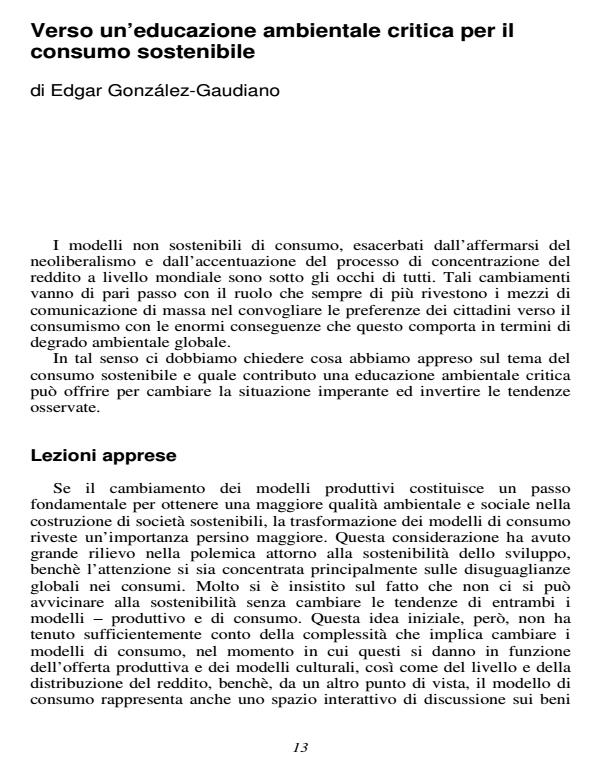Verso un’educazione ambientale critica per il consumo sostenibile
Journal title CULTURE DELLA SOSTENIBILITA '
Author/s Edgar González-Gaudiano
Publishing Year 2008 Issue 2007/2
Language Italian Pages 9 P. 13-21 File size 95 KB
DOI
DOI is like a bar code for intellectual property: to have more infomation
click here
Below, you can see the article first page
If you want to buy this article in PDF format, you can do it, following the instructions to buy download credits

FrancoAngeli is member of Publishers International Linking Association, Inc (PILA), a not-for-profit association which run the CrossRef service enabling links to and from online scholarly content.
The article underlines the evident link between the present consumption model and environmental degradation, and invites us to work towards sustainable consumption. This means re enforcing all of the practices orientated towards the substitution or minimisation of consumption of goods that are deemed critical from the environmental point of view, and encourage a different rational to spread a consumption model that considers the quality of the product and the conditions of its production distinguishing necessity from desire. A consumption model that contributes to the promotion of greater social equality and less environmental stress, through educational processes that stimulate critical thought at the moment of choice between various options, avoiding choosing those that are promoted as status symbols. Environmental education for sustainable consumption must also take into consideration products offered from companies or countries that promote superfluous or extravagant consumption, that use child labour and slaves, that do not adopt measures for environmental protection through emissions and waste control, that are not eco-efficient, that do not protect their workers from risks at work, that pay poor salaries or receive tax exemptions, special subsidies or preferential treatment that creates an unfair advantage over other countries. In the same way, education for sustainable consumption must raise attention to publicity campaigns, in a context in which the target population is seen as a passive client and vehicle to globalise the material ways of life of the North Western countries. School on its own however cannot reach the results that are urgently needed: it is necessary to fight on a broader front, that involves key social actors and to be aware that we are fighting a long battle.
Edgar González-Gaudiano, Verso un’educazione ambientale critica per il consumo sostenibile in "CULTURE DELLA SOSTENIBILITA '" 2/2007, pp 13-21, DOI: